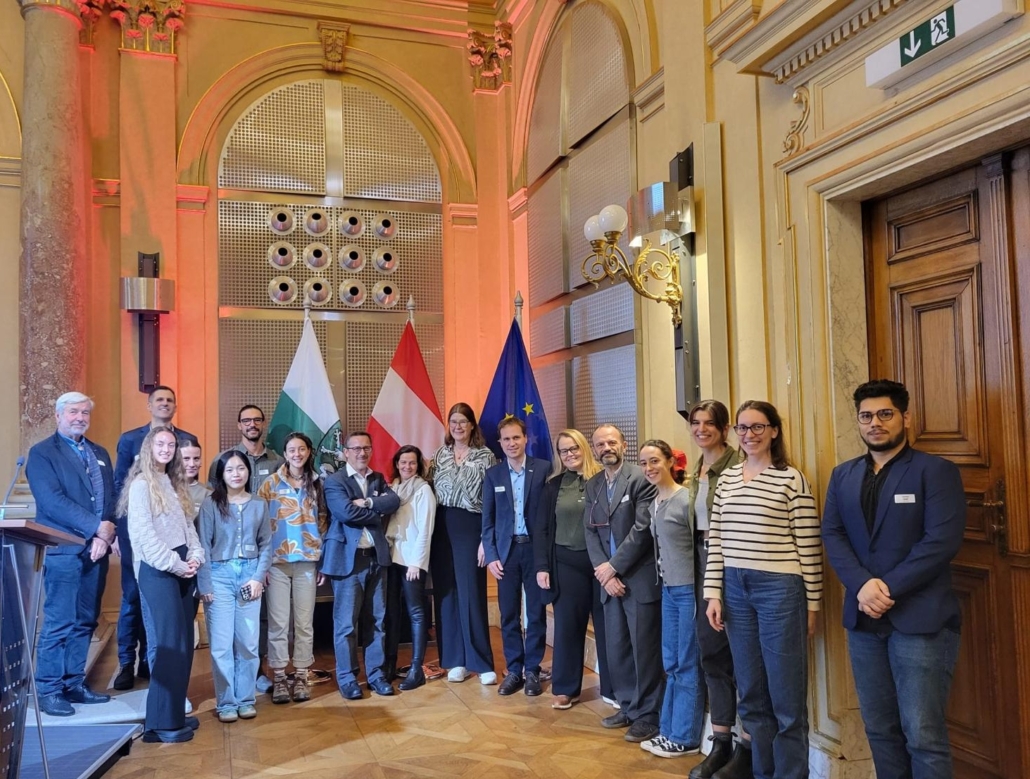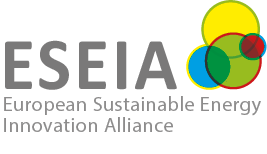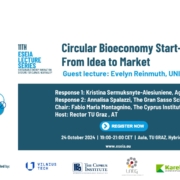11th ESEIA Lecture Series Overview: Circular Bioeconomy Start-Up Villages – From Idea to Market
On 24 October 2024, the European Sustainable Energy Innovation Alliance (ESEIA) held its 11th Lecture Series on the topic Circular Bioeconomy Start-Up Villages – From Idea to Market. Hosted both in person at TU Graz and live-streamed online, the event drew over 40 participants from 12 countries. This hybrid gathering brought together experts, students, and industry representatives, all keen to learn more about harnessing bioeconomic innovation to foster sustainable development in rural Europe.
The Vision of Circular Bioeconomy Start-Up Villages
The keynote presentation by Evelyn Reinmuth from the University of Hohenheim introduced the idea of circular bioeconomy start-up villages—ecosystems designed to foster local innovation by combining regional resources with access to global markets. Evelyn Reinmuth explained how such initiatives can address challenges specific to rural Europe, including those created by globalization and urbanization. By promoting bioeconomic development tailored to the needs and strengths of rural areas, these start-up villages serve as a model for sustainable growth, preserving rural heritage while addressing contemporary environmental challenges.
Following her presentation, Kristina Šermukšnytė-Alešiūnienė from AgriFood Lithuania provided insights on the startup village concept from a Lithuanian perspective. She emphasized the importance of place-based problem-solving and the creation of unique innovation ecosystems that respect the identity and autonomy of rural communities. These approaches empower local stakeholders while integrating bioeconomic practices that foster resilience and adaptability.
Fabio Maria Montagnino from The Cyprus Institute chaired the session, guiding the discussion and underscoring the interdisciplinary nature of circular bioeconomy as a crucial driver of sustainable rural development. Michael Monsberger, Vicerector of Infrastructure and Sustainability at TU Graz, graciously hosted the event, further enriching the conversation by highlighting the role of academia in promoting practical solutions that address the economic, environmental, and social dimensions of rural sustainability.
The session concluded with a dynamic Q&A where in-person and online participants posed thought-provoking questions about the practical applications of bioeconomy in rural areas. The dialogue addressed several key issues, including the socio-economic implications of bioeconomic initiatives and the need for interim, flexible solutions that can adapt to the existing structure and practices of rural communities.
Key Takeaways from the Lecture
- Circular Bioeconomy Start-Up Villages: These villages are uniquely positioned to foster economic resilience and growth in rural areas, offering pathways to sustainability that are deeply rooted in local resources and values.
- Local-Global Nexus: By pairing local resources with external innovations and markets, start-up villages can drive sustainable growth that benefits the wider region while preserving rural traditions and knowledge.
- Place-Based Problem-Solving: Interdisciplinary and place-based approaches are critical to ensuring that bioeconomic solutions are tailored to the needs and characteristics of rural communities.
- Socio-Economic Adaptability: Bioeconomy solutions must be flexible and, in some cases, interim, to adapt to existing ecological and socio-economic structures without compromising stakeholder autonomy.
- Engagement from Gen-Z: Students attending the event voiced enthusiasm for rural development, reflecting a growing trend among younger generations to seek opportunities that align with their values of sustainability and rural lifestyle.
Expanding the Network for Rural Innovation
This event showcased the potential for broader collaboration, with participants from universities, research institutes, and industry eager to support bioeconomic initiatives. The enthusiasm from Gen-Z students demonstrated that rural innovation has a promising future, with younger generations increasingly inclined toward sustainable, rural-based lifestyles.
The ESEIA team is grateful to Evelyn Reinmuth, Kristina Šermukšnytė-Alešiūnienė, Fabio Maria Montagnino, and Michael Monsberger for their invaluable contributions. We extend our thanks to TU Graz for hosting and to ESEIA members, including Vilnius Gediminas Technical University (VILNIUS TECH), The Cyprus Institute, LNEG – Laboratorio de Energia, Karelia University of Applied Sciences, and Savonia University of Applied Sciences, whose support was instrumental in the event’s success.
Continuing the Conversation on Sustainable Rural Development
The insights from this session underscored the importance of community-based approaches and strategic resource management in fostering entrepreneurship in rural areas. As the European Bioeconomy University Alliance continues to grow, so too will the opportunities for knowledge exchange and collaboration to advance the circular bioeconomy across Europe.
For those who missed the event, a recording is available on the ESEIA YouTube official channel.
Stay tuned to our channels for updates and to follow the ongoing conversation on circular bioeconomy and rural development.
About ESEIA Lecture Series: The ESEIA Lecture Series Sustainable Energy Innovation Systems for Climate Neutrality aims to provide a platform for exchanging perspectives between different societal actors on what must be done to achieve climate neutrality by 2050. The invited speakers for the lectures are experts in their fields, which makes this series organized in cooperation with the Graz University of Technology an excellent educational and networking platform for everyone interested in creating a climate-neutral future.
🔗 For more information or to get involved, please contact us at office@eseia.eu.





